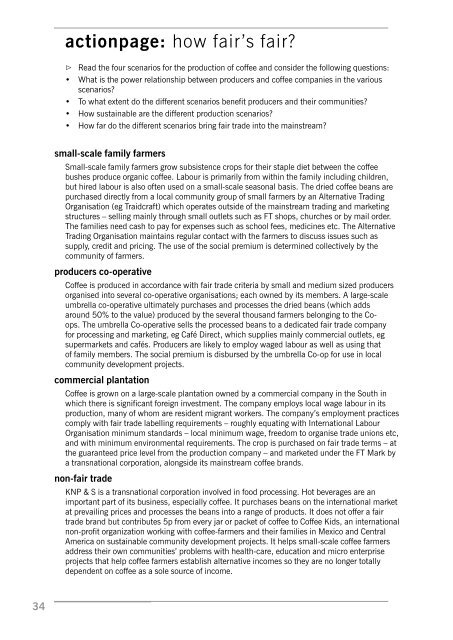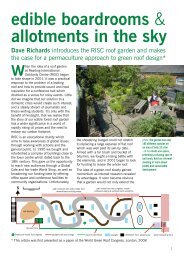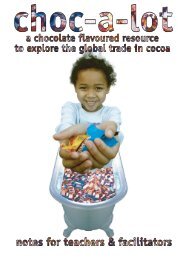Cost of coffee.indd - RISC
Cost of coffee.indd - RISC
Cost of coffee.indd - RISC
Create successful ePaper yourself
Turn your PDF publications into a flip-book with our unique Google optimized e-Paper software.
actionpage: how fair’s fair?<br />
s Read the four scenarios for the production <strong>of</strong> c<strong>of</strong>fee and consider the following questions:<br />
• What is the power relationship between producers and c<strong>of</strong>fee companies in the various<br />
scenarios?<br />
• To what extent do the different scenarios benefit producers and their communities?<br />
• How sustainable are the different production scenarios?<br />
• How far do the different scenarios bring fair trade into the mainstream?<br />
small-scale family farmers<br />
Small-scale family farmers grow subsistence crops for their staple diet between the c<strong>of</strong>fee<br />
bushes produce organic c<strong>of</strong>fee. Labour is primarily from within the family including children,<br />
but hired labour is also <strong>of</strong>ten used on a small-scale seasonal basis. The dried c<strong>of</strong>fee beans are<br />
purchased directly from a local community group <strong>of</strong> small farmers by an Alternative Trading<br />
Organisation (eg Traidcraft) which operates outside <strong>of</strong> the mainstream trading and marketing<br />
structures – selling mainly through small outlets such as FT shops, churches or by mail order.<br />
The families need cash to pay for expenses such as school fees, medicines etc. The Alternative<br />
Trading Organisation maintains regular contact with the farmers to discuss issues such as<br />
supply, credit and pricing. The use <strong>of</strong> the social premium is determined collectively by the<br />
community <strong>of</strong> farmers.<br />
producers co-operative<br />
C<strong>of</strong>fee is produced in accordance with fair trade criteria by small and medium sized producers<br />
organised into several co-operative organisations; each owned by its members. A large-scale<br />
umbrella co-operative ultimately purchases and processes the dried beans (which adds<br />
around 50% to the value) produced by the several thousand farmers belonging to the Coops.<br />
The umbrella Co-operative sells the processed beans to a dedicated fair trade company<br />
for processing and marketing, eg Café Direct, which supplies mainly commercial outlets, eg<br />
supermarkets and cafés. Producers are likely to employ waged labour as well as using that<br />
<strong>of</strong> family members. The social premium is disbursed by the umbrella Co-op for use in local<br />
community development projects.<br />
commercial plantation<br />
C<strong>of</strong>fee is grown on a large-scale plantation owned by a commercial company in the South in<br />
which there is significant foreign investment. The company employs local wage labour in its<br />
production, many <strong>of</strong> whom are resident migrant workers. The company’s employment practices<br />
comply with fair trade labelling requirements – roughly equating with International Labour<br />
Organisation minimum standards – local minimum wage, freedom to organise trade unions etc,<br />
and with minimum environmental requirements. The crop is purchased on fair trade terms – at<br />
the guaranteed price level from the production company – and marketed under the FT Mark by<br />
a transnational corporation, alongside its mainstream c<strong>of</strong>fee brands.<br />
non-fair trade<br />
KNP & S is a transnational corporation involved in food processing. Hot beverages are an<br />
important part <strong>of</strong> its business, especially c<strong>of</strong>fee. It purchases beans on the international market<br />
at prevailing prices and processes the beans into a range <strong>of</strong> products. It does not <strong>of</strong>fer a fair<br />
trade brand but contributes 5p from every jar or packet <strong>of</strong> c<strong>of</strong>fee to C<strong>of</strong>fee Kids, an international<br />
non-pr<strong>of</strong>it organization working with c<strong>of</strong>fee-farmers and their families in Mexico and Central<br />
America on sustainable community development projects. It helps small-scale c<strong>of</strong>fee farmers<br />
address their own communities’ problems with health-care, education and micro enterprise<br />
projects that help c<strong>of</strong>fee farmers establish alternative incomes so they are no longer totally<br />
dependent on c<strong>of</strong>fee as a sole source <strong>of</strong> income.<br />
34




